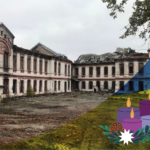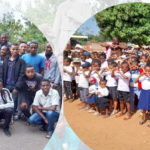"The Heart of Jesus, as our Founder told us so well, continues to be our great treasure. The treasure from which we can draw things old and new (cf. Mt 13:52), traditional and new, from which we can learn to grow in the relationships that our world today demands of us in openness and coexistence."
This is not the first time Father Carlos Luís Suárez has visited the Portuguese Province. He already had opportunities to be in Portugal on other occasions. Although he spent most of his Dehonian religious life in Venezuela, he is originally from the Canary Islands (Spain). He has already had the opportunity to give lectures at academic events, making use of his formation as a recognized biblical scholar, a specialist in the Old Testament.
This time, we welcomed him as Superior General of the Congregation of the Priests of the Sacred Heart of Jesus (Dehonians), elected in 2018. He was among us to carry out a canonical visitation.
Who is the Superior General and what is his mission?
The Superior General is a member of the Congregation, who has been chosen to help us live in communion and in fidelity to the charism that we have received from our Father Founder. To accomplish this mission, he counts on the close collaboration of his councilors, who are also chosen by the General Chapter, and on the prayers of the religious and of so many people who accompany our service and our mission.
And in your case, how do you personally carry out the mission?
Personally, I try to live it as a part of the journey I make as a disciple, of my journey as a Christian. I understand that a story that began 57 years ago that, at a certain moment, led me to give an answer in the consecrated life that now passes through this way of accompanying the life of our Congregation.
At least in my case, the Superior General is not the one who knows the most about Father Dehon, nor is the one who lives religious life the best, but he is someone who understands that, within our reality, he has received a trust so that all of us help center our lives on a charism that does not belong to us, but that we have to welcome and serve.
You were elected in 2018 to this position which you have been carrying out. How would you describe these years?
Under the sign of joy… It has been a joy to be able to meet with so many brothers, to know situations, collaborators, places that are a testimony of fidelity to the Gospel. That they are people who work, who struggle, who search, who dream. And this is a joy, to be able to recognize it.
Along with joy, there is also a feeling of not always knowing how to solve a problem, of not always having an idea to give, nor of being able to contribute something that others expect.
Can we say that suffering is part of the mission of the Superior General of the Congregation? In the sense of suffering with those who suffer?
Of course! It is to experience something very human: we don’t know everything; we can’t do everything… It is to discover limits. This can be a fascinating experience, insofar as it helps me to think of the other as someone necessary, or it can be lived as a frustration. In this case it depends a lot on how one faces it.
Pope Francis is known for his charism and leaves an indelible mark on the Church and society. Is there room for a Dehonian contribution in this age of mercy, as the current Pope preaches?
Without a doubt. Already when the Holy Father published the Encyclical Fratelli tutti (October 3, 2020), I remember that we wrote a letter to the Congregation where we went so far as to say that it seemed as if the Encyclical had been written by a Dehonian. Its expressions felt that way. It is perfectly in tune with a spirituality that we received from Fr. Dehon and, above all, with what we ourselves understand as the spirituality that comes from the Heart of Christ. It doesn’t mean that we stop with Pope Francis, but in him we recognize someone who helps us live the Gospel, which for us must always be at the center, as that which remains. And whatever helps to open one’s life, heart, or community to the Gospel is always welcome.
In 2025 we will celebrate the jubilee of the centennial of the death of Father Dehon. What do these one hundred years without the physical presence of the Founder mean, living his charism today? 100 years later, is Fr. Dehon still relevant?
I ask myself, as relatives sometimes selfishly do when a loved one passes away: “And what has he left me? What is my inheritance: where is my share?
I believe that the centennial must effectively lead us to this question: “Where is my inheritance?”, but in the sense of asking ourselves what I am going to do with this inheritance. How will I welcome the part that is mine. The the centennial should be lived as a great questioning about what we have done throughout these 100 years with the legacy that Father Founder left us: how are we living it, sharing it, deepening it? How are we updating it for our reality?
Let’s focus on the particular aspect of reparation. What can reparation in the manner of Father Dehon be today?
Reparation must always be a central element of our spirituality. Reparation and love. They are complementary, two ways of expressing the same reality. Between reparation and love there is an indissoluble link. We cannot separate one from the other: the one who loves makes reparation and only the one who allows himself to be repaired allows himself to be loved. I think that it is in this dynamic that we as a Congregation enter.
For this reason, recovering or always rethinking our charism of reparation means to enter this dynamic of letting ourselves be loved more, of letting ourselves be renewed by the love of Christ and, at the same time, feeling that this love needs to be recognized.
In these days, while visiting one of our brothers in our community in Aveiro, I asked him what it means for him to be a Dehonian, to which he replied: “A Dehonian is one who realizes that God is love”. I really liked this expression, with its own rather unusual verb “to catch” with all one’s strength; it is a matter of grabbing something with all one’s strength. Only in this way will we enter the dynamics of reparation, because if the great repairer is God himself, it is because he loves deeply. God is the greatest experience of a love shared and offered. That is where we must meet.
Over the course of a month, you were able to visit all the communities of the Portuguese Province: from the oldest presence, the Colégio Missionário Sagrado Coração, founded in 1947, to the most recent, in the pastoral zone of Barreiro, Setubal, now four years old. Is there hope for Dehonians in Portugal?
I would say that the Dehonians are a hope for Portugal, that we Dehonians are a hope for the Church, in the measure that we are faithful to the charism we have received and that we know how to be faithful witnesses to the Gospel. In this sense, I believe that the Province of Portugal has magnificent religious, eager to express much of what they live as Christians, as consecrated persons, in the apostolic choices they have made.
The Province has a good average age, and a significant number of very active religious. And this is always a reason for hope – insofar as we remain faithful to our roots and to what the Church has entrusted to us.
In these days could you identify challenges that you would like to launch to in the Portuguese Province?
The first challenge is to know how to offer our life.
That is the center. Because we are “Oblates”?
Exactly. Knowing how to offer our life means leaving selfishness, leaving exclusively personal projects, leaving isolation, discovering more teamwork. For example, regarding your work in parish ministry, I have no intention of telling you to leave parish work; I prefer to say: “work more as a team”.
I believe that is the key… In whatever we are doing, in what we discover as apostolic options, what must go hand in hand with this is a community commitment.
Can we say that rediscovering community is the great challenge?
It’s definitely one of them. A rather big one.
And the community is not only a place of residence, but as a place to live, a place where we dream and set out together to share what we are. And each one of us should always give the image that we are the expression of a project of a community that commits itself to the different tasks that it assumes.
Fr. Dehon left us a spiritual legacy that is valid not only for us religious but also for other people who are part of the Dehonian Family. Does the Superior General of the Dehonians have a dream for this Dehonian Family as an extended group of all those who let themselves be inspired by Fr. Dehon?
Yes, and I believe that Portugal can be of great help to the Congregation in this regard because it has already had the experience of accompanying very significant groups of the Dehonian Family, whether in the missionary and volunteer dimensions, or in prayer groups and in formation. I think that the Portuguese Province has worked quite well in this dimension of discovering with others what the Dehonian charism means.
Does this mean that the Dehonian Family is important, not only as an expansion of SCJs, but it can also contribute to a deeper understanding of the charism of Father Dehon to the religious of the congregation?
Absolutely. The Dehonian religious has a way of living the charism that belongs to the Church. The charism is a property of the Church, a gift of the Church, and a gift of the Spirit for the Church. We SCJs are not the owners.
From other dimensions of Christian life, many people help us to see the richness of the charism, lived in the family, in society, in the services that so many people carry out. I believe that what we must do is always support and admire each other in the many facets of this charism that – I would say – we have only just discovered. It always has something more to say. It is the life of the Spirit.
To conclude, I would ask you to leave a message, in this month of the Heart of Jesus, for our readers, who are above all benefactors who, with their prayers and their material help, help to maintain our works.
The Heart of Jesus, as our Founder told us so well, continues to be our great treasure. The treasure from which we can draw things old and new (cf. Mt 13:52), traditional and new, from which we can learn to grow in the relationships that our world today demands of us in openness and coexistence,
The Heart of Jesus continues to be our great school to learn how to be human. Only when we learn to be human will we discover ourselves as sons and daughters of God and as brothers and sisters.
To orient our gaze to the Heart of Christ is to learn to orient our gaze to the hearts of those who walk side by side with us.
And how good it would be if we could all recognize ourselves by similarities to the Heart of Christ.




